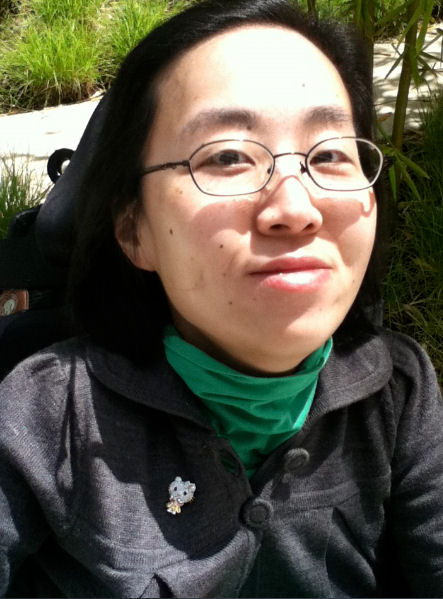Alice Wong is a member of the Asian American disability rights advocacy community. To learn more about this community, check out my interview yesterday with Jean Lin of Asians & Pacific Islanders with Disabilities Coalition.
How do you see yourself as Disabled and Proud?
I see myself as a proud disabled Asian-American woman. Note, I added the word ‘proud’ because I believe that there are many people who may have a disability (invisible or visible) who do not claim this identity at all.
Like the LGBTQ community and many other communities, being open about who you are sends a message that it’s not something to be embarrassed or ashamed about. Language matters. I used to use ‘person-first’ language when describing myself, (e.g., person with a disability), because it was a response to historic dehumanizing labels such as ‘the handicapped,’ ‘the disabled,’ and ‘the feeble-minded.’ There’s a growing usage of ‘disabled person’ by many people to indicate that one cannot separate one’s disability from one’s socio-cultural identity. It would be impossible to separate my race from my identity and shouldn’t it be the same for my disability?
There is some anxiety among people w/ disabilities who don’t want people to ‘see’ their disability as their primary identity, that they are so much more than ‘just disabled.’ To me, this shows how fear and shame about disability is internalized among people with disabilities. It’s taken me a while, but I have evolved and become comfortable in my multiple identities. They are just a part of who I am. How people perceive me is mostly out of my control. Pride isn’t about having this rosy view of disability; it’s about embracing and valuing the good, bad, messed-up, beautiful and complex.
How has being an Asian American affected your life as a disabled person, or vice versa?
Growing up disabled and Asian-American I have seen the silence around disability issues. Families may face linguistic or cultural barriers when accessing services. Doctors, professionals or other ‘experts’ may not have disability or cultural competence when serving minorities w/ disabilities. Various Asian-American groups may have unique understandings and concepts of ‘disability,’ ‘health,’ and ‘illness,’ that are all informed by culture, time and place.
For example, one thing that really pisses me off is the stigma regarding mental illness among Asian-Americans. There are a lot of advocacy groups trying to address to needs of Asian Americans with mental illness but there are significant challenges: 1) many Asian-American youth may find it difficult to seek help and share this with their family due to negative attitudes; 2) there aren’t enough Asian-American mental health professionals or peer support mentors that can adequately meet the demand for culturally competent care; and 3) stereotypes such as the ‘model minority’ can play a toxic role preventing Asian Americans from getting help. Things are more complicated but I’m just broadly outlining some issues based on a small survey I conducted.
I know that disability is more than just a medical diagnosis, health condition or impairment—it’s a social construct where systemic oppression, policies, and negative attitudes towards difference contribute to the definition of disability more than any individual’s ‘disease’ or ‘limitation.’ Being Asian-American shows me that disability is something different among groups and that the larger normative concepts of ‘independent living’, ‘disability’, and ‘independence’ do not take the perspective from minority groups into account. This is why diversity within the Asian-American community and disability community is important — they aren’t mutually exclusive groups. I’d love to see more partnerships and collaboration among community-based organizations that organize around ‘disability’ issues and ‘Asian-American’ issues while recognizing there are many points of commonality.
Contact Info and Websites
- Twitter: @SFdirewolf
- LinkedIn: Alice Wong
________________
Tune in every day this month for Reappropriate’s daily “Faces of Asian America: Being X” series, which will profile an awesome Asian American in celebration of AAPI Heritage Month.

